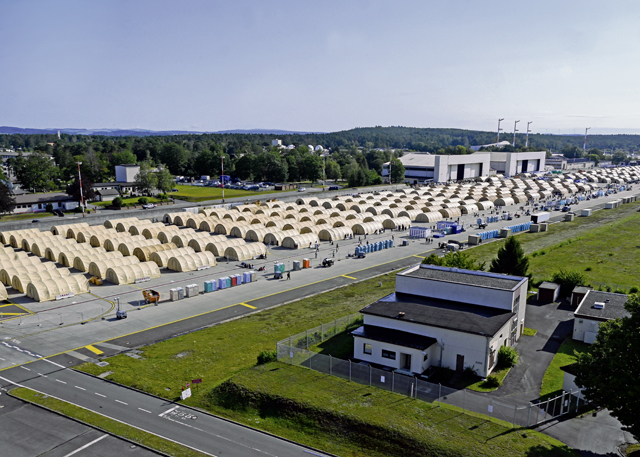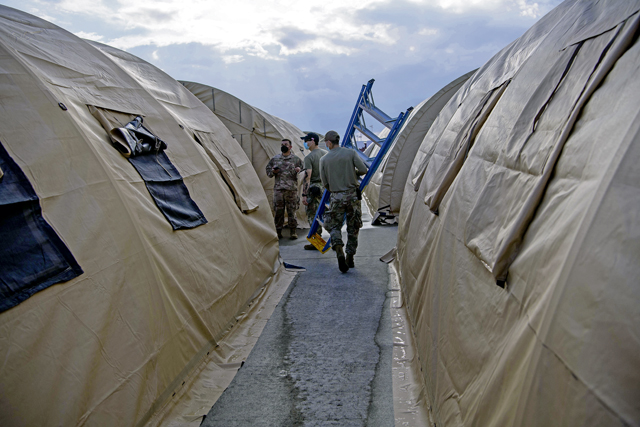
As the Air Force’s largest mobility hub, Ramstein is often a flurry of activity. But for more than a week, the base has been experiencing an unprecedented level of activity as thousands of Airmen, Soldiers, volunteers, augmentees, and other community partners support a massive evacuation operation here.
Following the rapid deterioration of security in Afghanistan, the first of many aircraft carrying U.S. citizens, Special Immigrant Visa applicants and other vulnerable Afghans landed here Aug. 20 as part of Operation Allies Refuge. Since then, Ramstein has received more than 11,000 evacuees as they await transportation to their final destination. More than 2,500 people have already departed Ramstein for the United States.

“While U.S. military members defended our homeland through combat operations in Afghanistan over the last 20 years, we depended on local Afghans to provide information, guidance, interpretation and more,” said U.S. Air Force Maj. Gen. Randall Reed, Third Air Force commander. “Now those partners who served alongside us need our help.”
With little time to prepare, the base initially cleared out two of its aircraft hangars and set up hundreds of cots and sleeping bags to provide temporary shelters. That plan quickly changed when base leaders realized Ramstein would become U.S. European Command’s primary evacuation hub. Base Airmen, joint partners, and an entire village of family members and volunteers worked around the clock to expand the base’s capacity to provide a safe haven for as many evacuees as possible. The effort required a broad spectrum of expertise and support including medical, logistics, maintenance, civil engineering, security and food services.
“Ramstein personnel are working tirelessly to ensure the evacuees have a safe, secure place to rest,” said U.S. Air Force Brig. Gen. Josh Olson, 86th AW commander. “I am incredibly proud of our team’s ability to adapt and mobilize this herculean effort at a moment’s notice.”
An undertaking of this magnitude requires enormous resources, planning and people to support and sustain it. More than 350 tents now provide temporary shelters on the base’s ramps, complete with more than 10,000 cots and sleeping bags. The encampment, known as pods, also contains tents for prayer and medical services, showers, more than 600 Porta Johns, and space for recreation. The base also quickly procured a contract with a local vendor to provide 30,000 meals per day. Dozens of pallets of water bottles are trucked in daily, and 14 water buffaloes provide additional water.
To meet mission demand, Ramstein adjusted non-essential base services, cancelled routine medical appointments and postponed leadership courses, such as Noncommissioned Officer Academy, First Term Airman Course and Airmen Leadership School, to free up additional manpower to sustain the operation.
“Even standard ops tempo at Ramstein is fast paced, but we continue to dig deep to find bandwidth to carry on in support of OAR,” said 86th AW Command Chief Master Sgt. Hope Skibitsky. “Right now our Airmen are getting more than an education in leadership theory. But it’s important we find rest where we can. This is a marathon, not a sprint. What I’m seeing on the ground is leadership in action from all ranks, overcoming daily challenges as we tackle this truly complex operation. I couldn’t be more proud of our Airmen.”
Ramstein is strategically located near U.S. Army units, many of which have provided resources, equipment and personnel to assist the operation. U.S. Army Garrison Rheinland-Pfalz Command Sgt. Major Stephen LaRocque said the garrison is acting as a facilitator by bringing teams together to accomplish the mission.
“I’ve been to Afghanistan numerous times,” said LaRocque. “I’ve had a lot of Afghan soldiers, Afghan families and interpreters help out a lot of U.S. citizens over there, as well. So it’s an honor to help get them to safety and to bring a lot of people back home. It means everything.”
The U.S. Army’s 21st Theater Sustainment Command provided hundreds of Soldiers from the 16th Sustainment Brigade; two 30th Medical Brigade treatment teams; biometric support from the 18th Military Police Brigade; and 120 Soldiers from the 10th Army Air and Missile Defense Command to aid security operations. Additionally, medical care teams from Landstuhl Regional Medical Center are providing around-the-clock emergency medical care.
Local helping agencies such as the American Red Cross and USO, and good samaritans in the KMC First Sergeant council, immediately mobilized to source donations and volunteers. An overwhelming outpouring of generosity swept across the Kaiserslautern Military Community, so much so that the Base Exchange says they must increase their supply to meet demand.
As the thousands arrive in clusters, medical teams and helping agencies are among the first to greet evacuees before settling into temporary quarters. The wing made sure that culture, dietary restrictions and religious support were integrated into the planning and execution. Prayer tents offer a quiet space, and Chaplain (Capt.) Mir Ali — one of only five imams in the Air Force — blesses thousands of meals daily.
Evacuees remain on the installation as they transit through Germany. The pod cities are a bustle of activity, mostly stemming from energetic children challenging Airmen to soccer matches. Several military volunteers dedicate time to keep the youngsters engaged and busy.
This historic mission comes as the world grapples with an ongoing pandemic. The base is taking appropriate security and health protection measures to protect the safety and wellbeing of the evacuees and members of the community.
To date, Ramstein has received evacuees from Afghanistan on more than three dozen military aircraft flights, and the number continues to grow by the day. Base officials make daily assessments and problem-solve in order to increase lodging capacity.
For more on Operation Allies Refuge, continue following Team Ramstein on Facebook @RamsteinOfficial and Instagram @ramsteinairbaseofficial.


